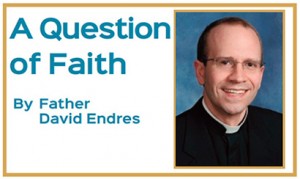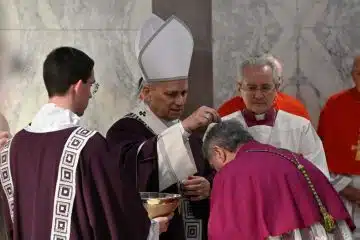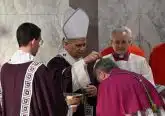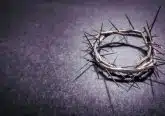Father Endres for March: What happened to penance on Fridays?
 Q: My understanding is that Catholics are to observe some form of penance every Friday during the year, even during Ordinary Time. So even though we’re allowed to eat meat on Fridays outside of Lent, there is an obligation for Catholics to do (or not do) something on these Fridays. Is that true?
Q: My understanding is that Catholics are to observe some form of penance every Friday during the year, even during Ordinary Time. So even though we’re allowed to eat meat on Fridays outside of Lent, there is an obligation for Catholics to do (or not do) something on these Fridays. Is that true?
A: One of the constants of the Christian life is the need for penance. Since the time of the early church, Christians have imitated Jesus, who fasted and prayed for 40 days in the desert (Mark 1:13). Special attention has been paid to performing penance during the season of Lent and on Fridays, because these days especially commemorate Jesus’ suffering for our salvation.
Historically, Catholics were held to more precise and numerous penitential practices, such as abstinence from meat on all Fridays, additional days of fasting and abstinence throughout the year (the vigils of certain feasts and on the “Ember Days,” which were particular Wednesdays, Fridays, and Saturdays), and fasting and limited eating of meat (only one meal) on Lenten weekdays from Monday through Thursday.
In 1966, Pope Paul VI promulgated a new set of regulations for fasting and abstinence, simplifying the required penances and allowing for greater personal freedom in choosing penances. Catholics are asked today to abstain from meat on Fridays during Lent, and to both fast (only one full meal and two lesser meals) and abstain from meat on Ash Wednesday and Good Friday.
Though the precise requirements of fasting and abstinence have been lessened, the obligation for some form of penance each Friday remains. Whatever penance is chosen is up to the individual. It can be varied or repeated, but should be carried out each Friday during the church year when another penance has not been obliged (which would be all Fridays outside of Lent). Penances could include not snacking between meals, abstaining from internet or TV for the day, or forgoing dessert, soda, or alcoholic beverages. The chosen penance could also entail doing some charitable act such as visiting the sick or assisting a neighbor.
In allowing one to choose his or her penance, it was hoped that penitential practices might become more meaningful. However, in many cases, the practice of Friday penances practically ended with the reform of required fasting and abstinence. Yet the older disciplines may still be practiced. The previous penance of abstaining from meat on Friday remains especially recommended by the church, as is some form of fasting during the weekdays of Lent, which, though not obligatory, is strongly recommended as a self-imposed observance (see “Pastoral Statement on Penance and Abstinence,” 1966).
Whatever penance is undertaken, the purpose of penance is the same: to unite oneself to Jesus in his suffering and to maintain the discipline that aids one in living a virtuous life. As sin often involves a misuse of created things, penance allows for a correction to our approach to the things of this world. But penances are an aid to virtue, not an end in of themselves.
Throughout its history, the church has reminded the faithful of the importance of doing penance. The frequency and kind of penance asked of Christians has changed throughout time. Today’s penitential practices emphasize both the freedom and responsibility of the penitent, but do not nullify the need to do penance. We are exhorted in the Gospel of Matthew, “Produce good fruit as evidence of your repentance” (Matthew 3:8). May the penances we undertake, likewise, be a means to our growth in holiness and as signs of our conversion in Christ.
Father Endres is dean of Mount St. May’s Seminary of the West and the Athenaeum of Ohio. Send your question of faith to [email protected].













